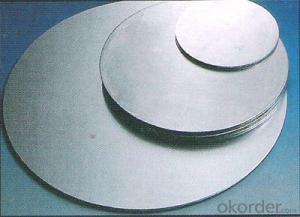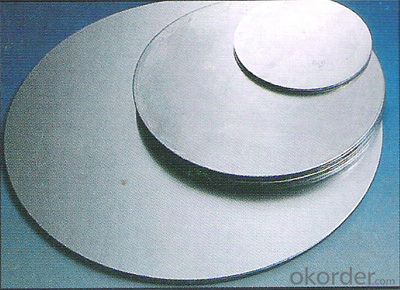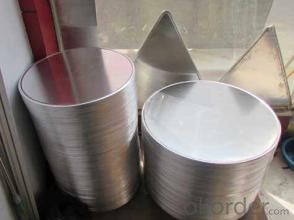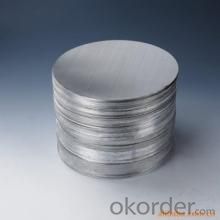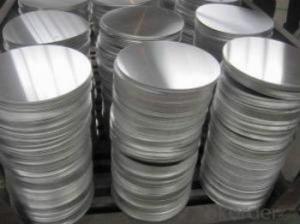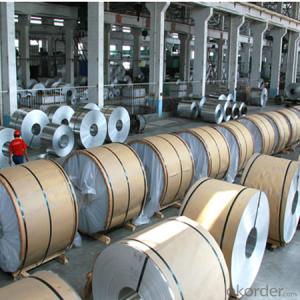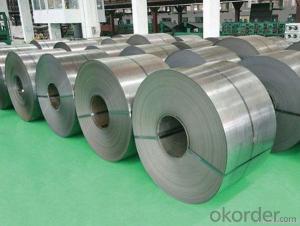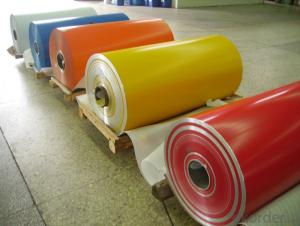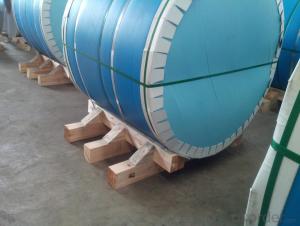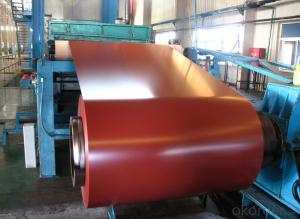ASTM-3003 Mill Finished DC Aluminium Circle Aluminum Coil Slitter
- Loading Port:
- Shanghai
- Payment Terms:
- TT OR LC
- Min Order Qty:
- 5 m.t.
- Supply Capability:
- 2000 m.t./month
OKorder Service Pledge
OKorder Financial Service
You Might Also Like
Specification
1. Structure of ASTM - 3003 Mill Finished DC Aluminium Circle Description
ASTM - 3003 Mill Finished DC Aluminium Circle is one semi-finished aluminium material. The alloy AA1050 is widly used in building, industry ect. Its weight is much lower than steel. So many customers choosed aluminium material instead of steel.
2. Specification of ASTM - 3003 Mill Finished DC Aluminium Circle
ASTM - 3003 Mill Finished DC Aluminium Circle | |
Main Specification | |
Alloy | AA1xxx (AA1050, AA1060, AA1070, AA1100 etc.) |
AA3xxx (AA3003, AA3004, AA3005, AA3105 etc.) | |
AA5xxx, AA6XXX (AA5052,AA5083, AA5754, AA6061, AA6062 etc.) | |
AA8xxx(AA8011, AA8006 etc.) | |
Temper | H14,H16, H18, H22, H24, H26, H32,O/F, T4, T6, T651 |
Thickmess | 0.01mm-100mm |
Width | 30mm-1700mm |
Standard | GB/T 3880-2006/ASTM |
Special specification is available on customer's requirement | |
3. Application of ASTM - 3003 Mill Finished DC Aluminium Circle
(1).Interior: wall cladding, ceilings, bathrooms, kitchens and balconies, shutters, doors...
(2).Exterior: wall cladding, facades, roofing, canopies, tunnels,column covers , renovations...
(3).Advertisement: display platforms, signboards, fascia, shop fronts...
4. Feature of ASTM - 3003 Mill Finished DC Aluminium Circle
Surfact Quality :
Be free from Oil Stain, Dent, Inclusion, Scratches, Stain, Oxide Dicoloration, Breaks, Corrosion, Roll Marks, Dirt Streaks and other defect which will interfere with use,
Mechenical Property:
Chemical Composite and Mechanical Property
5. Certificate of ASTM - 3003 Mill Finished DC Aluminium Circle
SGS and ROHS(if client request, paid by client), MTC(plant provided), Certificate of Origin(FORM A, FORM E, CO), Bureau Veritas and SGS (if client request, paid by client), CIQS certificate
6. Image of ASTM - 3003 Mill Finished DC Aluminium Circle
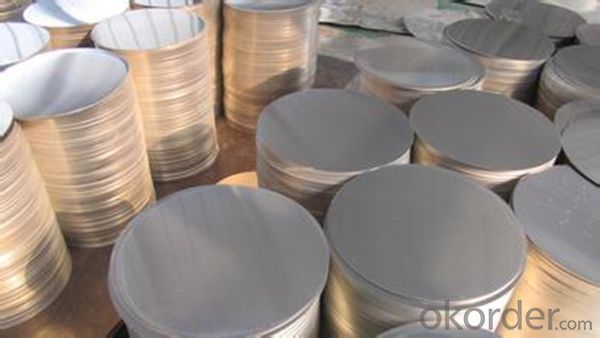
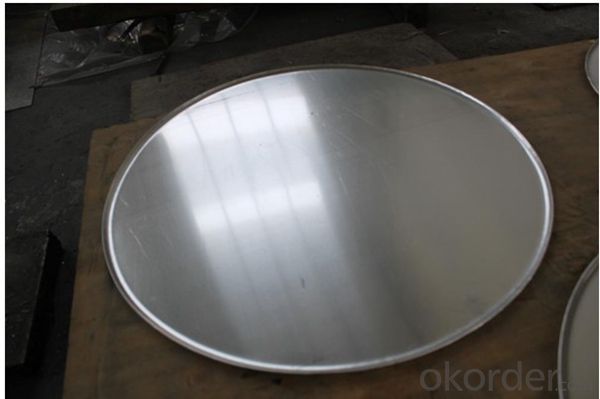
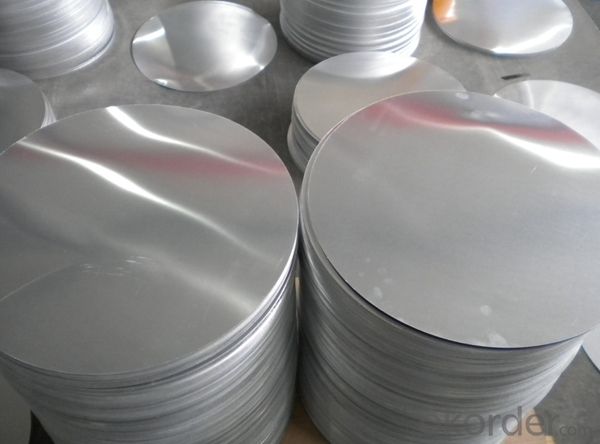
7. Package and shipping of ASTM - 3003 Mill Finished DC Aluminium Circle
First, plastic cloth with drying agent inside; Second, Pearl Wool ; Third, wooden cases with dry agent , fumigation wooden pallets, aluminum surface could cover blue PVC film
8. FAQ
1) What is the delivery time?
Depends on actual order, around 20 to 35 days
2) What is the QC system:
We have QC staff of 20 persons and advanced equipment, each production is with MTC traced from Aluminum ingot lot.
3) What market do you mainly sell to?
Australia, America, Asia, Middle East, Western Europe, Africa etc
- Q: Can aluminum coils be used for HVAC systems?
- Indeed, HVAC systems can utilize aluminum coils. Aluminum coils are frequently employed in HVAC systems due to their numerous advantages over alternative coil materials. To begin with, aluminum is a lightweight substance, facilitating easier handling and installation. Consequently, this can lead to decreased installation costs and diminished strain on the HVAC system's structure. Furthermore, aluminum coils possess exceptional heat transfer properties. They proficiently transfer heat from the refrigerant to the surrounding air, a critical aspect for the efficient operation of the HVAC system. Additionally, aluminum coils demonstrate a high resistance to corrosion, a quality of particular significance in environments with high humidity or pollutant levels. Moreover, aluminum stands as an immensely recyclable material, rendering it an environmentally conscious choice for HVAC systems. It can be effortlessly recycled and reused, thereby reducing the necessity for extracting new materials and minimizing waste generation. To summarize, aluminum coils represent a reliable and efficient selection for HVAC systems, offering remarkable heat transfer capabilities, durability, and environmental sustainability.
- Q: What is a better deal?Aluminum Cookware ( Paula Deen)orHard Anodized ( Rachael Ray )
- Cook's Illustrated did a study on this and they ended up with the Walmart brand as the best buy because of the inexpensive price and good quality.
- Q: What are the different surface finishes available for aluminum coils?
- There are several different surface finishes available for aluminum coils, including mill finish, brushed finish, embossed finish, anodized finish, and painted finish.
- Q: Are there any restrictions on the coil surface quality of aluminum coils?
- Aluminum coils have specific limitations when it comes to their surface quality. The quality of the coil's surface is crucial as it impacts both the overall performance and appearance of the final product. Various restrictions are in place to maintain the coil's surface quality, including the following: 1. Surface defects: Visible imperfections like scratches, pits, dents, or cracks should not be present on aluminum coils. These defects can hinder the coil's functionality and affect the aesthetic appeal of the end product. 2. Surface smoothness: The surface of aluminum coils should possess a uniform and smooth finish. Excessive roughness can hinder the adhesion of coatings or paints and affect the coil's ability to be shaped as desired. 3. Surface cleanliness: Aluminum coils should be devoid of contaminants such as dirt, oil, or grease. These impurities can interfere with subsequent processes like painting, coating, or bonding, and impact the overall performance of the coil. 4. Surface oxidation: Aluminum is prone to oxidation, resulting in the formation of a thin oxide layer on the surface. While a certain level of oxidation is acceptable, excessive oxidation can hinder the adhesion of coatings or paints and affect the coil's resistance to corrosion. 5. Surface flatness: Aluminum coils should possess a flat and even surface. Any waviness or unevenness can cause complications during subsequent manufacturing processes like stamping, bending, or rolling. Maintaining these restrictions on coil surface quality is essential to ensure that aluminum coils meet the desired specifications and can be effectively utilized in various industries, including automotive, construction, packaging, and electrical.
- Q: Can the color coated aluminum roll be bent easily and won't break?
- As an ornamental material, it has the incomparable advantages of the following products. It can be guaranteed to be durable at least for 30 years after being treated with special surface. It is durable and has super weatherability. Fluorocarbon coating aluminum coil is made of fluorine enyne fluorocarbon resin as basic monomer, acid and alkali corrosion resistance, friction resistance and its decay, compared with plastic coating, molecular structure, sun room, bright and smooth: product classification, UV absorbers can be divided according to the gloss matte and high gloss series.
- Q: Can the displacement sensor be used for real-time measurement of the aluminum coil thickness?
- Yes, you can use two sensors to measure thickness, either contact sensor or laser sensor
- Q: Are aluminum coils suitable for weather-resistant applications?
- Yes, aluminum coils are suitable for weather-resistant applications. Aluminum is known for its excellent corrosion resistance, making it a popular choice for outdoor and weather-exposed applications. The metal forms a protective oxide layer on its surface when exposed to air, which acts as a barrier against moisture, humidity, and other weather elements. This oxide layer helps prevent the metal from rusting or deteriorating over time. Additionally, aluminum's lightweight nature and high strength-to-weight ratio make it a practical choice for various weather-resistant applications, such as roofing, gutters, siding, and outdoor signage.
- Q: Is it possible to create personal roofing material using aluminum coils?
- <p>Yes, you can use aluminum coils to make your own roofing material. Aluminum is a popular choice due to its durability, lightweight, and resistance to corrosion. To create roofing material, you would need to cut the coils to appropriate lengths, form them into panels, and possibly add protective coatings or finishes. However, this process requires specialized equipment and knowledge of roofing construction to ensure the material is safe, watertight, and structurally sound. It's also important to consider local building codes and regulations that may affect the suitability of homemade roofing materials.</p>
- Q: How is Aluminum formed??Thanks!!
- I don't think any significant quantity of aluminum is produced by reduction with carbon - aluminum is too reactive for this to give a good yield. Instead, the metal is produced by electrolysis in the Hall-Heroult process. First, aluminum ore is processed to aluminum oxide in the Bayer process. This ore, bauxite, consists of aluminum oxides and hydroxides with some impurities, mostly iron oxides. The aluminum oxide/hydroxides are dissolved with concentrated sodium hydroxide in water. Iron oxides and hydroxides do not dissolve, and are filtered out. AlOOH (insoluble in water) + NaOH + H2O ----- NaAl(OH)4 (soluble in water) Neutralizing or cooling this solution will cause aluminum hydroxide to precipitate out. This is then heated strongly to drive off water and produce aluminum oxide. 2Al(OH)3 ----- Al2O3 + 3H2O This aluminum oxide can be melted and then electrolyzed to make the metal and oxygen gas. However, the melting point of aluminum oxide is very high, so it is dissolved in molten cryolite (Na3AlF6), which has a lower melting point. This is then electrolyzed, and molten aluminum collects at the bottom of the cell (cathode), where it can be drawn off. Because the oxygen that would be formed will attack most metal electrodes, a sacrificial carbon electrode is used for the anode and is oxidized to CO2. Very small amounts of aluminum metal occur in nature - it is usually found in association with fossil fuel deposits (which provide the reduced carbon necessary to reduce aluminum minerals).
- Q: Are aluminum coils suitable for electrical conductivity applications?
- Yes, aluminum coils are suitable for electrical conductivity applications. Aluminum is a good conductor of electricity, second only to copper in terms of conductivity. It is widely used in various electrical applications, including power transmission lines, electrical wiring, and electronic devices. Aluminum coils offer efficient electrical conductivity while being lightweight, cost-effective, and resistant to corrosion.
Send your message to us
ASTM-3003 Mill Finished DC Aluminium Circle Aluminum Coil Slitter
- Loading Port:
- Shanghai
- Payment Terms:
- TT OR LC
- Min Order Qty:
- 5 m.t.
- Supply Capability:
- 2000 m.t./month
OKorder Service Pledge
OKorder Financial Service
Similar products
Hot products
Hot Searches
Related keywords
